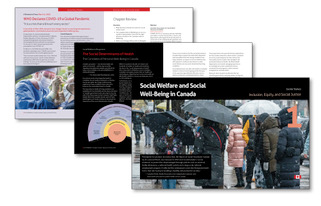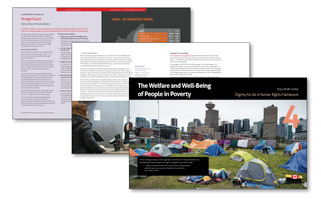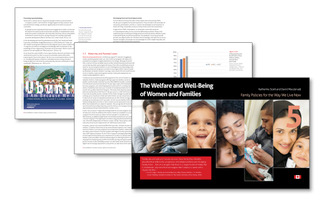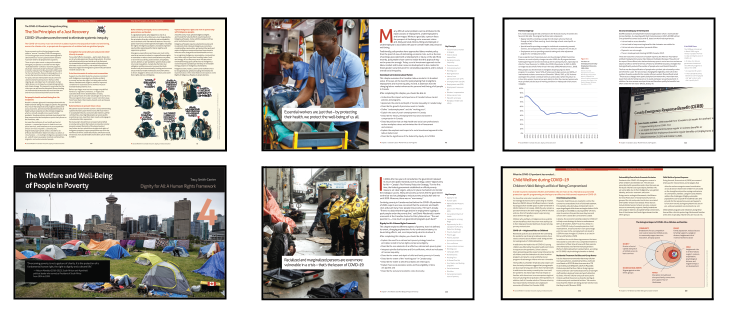

Click to open expanded view
Textbook
New Fourth Edition
Print and Digital Versions Available Now!
| ISBN | ISBN (Print): 978–1–55077–281–4 ISBN (Digital): 978–1–55077–282–1 |
| Edition | Fourth |
| Year | 2021 |
| Page Count | 528 |
$ 124.95 Digital Version $74.95
The social welfare policies and programs created after World War II in Canada were primarily designed to protect working people and to strengthen Canadian society. The postwar welfare state was not perfect, but it pointed in the right direction. However, under the pressures of neoliberal economic policies starting in the 1980s, many of these social welfare policies and programs were systematically eroded.
Then, in 2020, the COVID–19 pandemic hit.
The pandemic exposed multiple gaps and systemic weaknesses. It became clear that some populations were affected more harshly by the virus itself and by the various public health measures designed to deal with it. Racialized minorities, young people, and women lost jobs and incomes at a much higher rate due to their disproportionate labour market involvement in low-pay, low-benefit, and precarious jobs. Children, particularly vulnerable children, suffered as their visibility, socialization, and access to additional supports were removed when schools were closed. The atrocious conditions for some older Canadians in long- term care facilities were exposed, and many people with disabilities lost their access to programs that were not deemed essential services.

A recurring theme is individual and social well-being. Social welfare is more
than a reactive set of income and social service programs. It is a vast network of programs that ensures that everyone has access to a full range of opportunities to attain early childhood learning, educational achievement, economic and personal security, a clean environment, and social and health equity. Social well-being is holistic. It means having a voice in democratic processes, having housing and food security, having access to leisure and cultural activities, and having a lifestyle that contributes to physical and mental well-being.
Fundamentally, social welfare policies are mechanisms to provide resources and services to ensure that everyone has access to opportunities, regardless of their social location. In some cases, this means universal programs; in others, targeted programs may be needed in order to ensure equity.

Many of the people who gained from welfare state programs and the neoliberal policies of the late twentieth century belonged to populations that are considered dominant in Canadian society. This largely unearned privilege provided them more opportunities to increase their individual well-being. A central message in this new edition is to give voice to populations who do not have unearned privilege and to describe and highlight their voices and experiences. This includes people with precarious work, people in poverty, women and families, children whose early lives are lived through abuse and neglect, those whose lives are affected by mental health and substance use disorders, immigrants and temporary residents, racialized and older people, and people with disabilities.

Perhaps the most important agenda for all social workers embarking on their career in the twenty-first century is Truth and Reconciliation with Indigenous people across Canada. This requires acknowledging multiple histories and voices, and ensuring that each nation is respected for their unique history, culture, and healing journeys. Social workers have an additional responsibility to acknowledge past colonial practices within the profession, including within residential schools and child welfare. As social workers work to redress the harms and find new paths, it is especially important to ensure that practices of today both address the intergenerational trauma of yesterday and support healing for future generations.

Social welfare in Canada will always be evolving and changing as the political, environmental, social, and global context changes. The social safety net of the mid-twentieth century will not work for the twenty-first century. Rather than protections alone, the focus has to be on empowerment and access to opportunity, with decision making that is inclusive of multiple voices and histories. These perspectives are consistent with universal human rights which promote social and economic equality, promote the dignity and worth of people, and recognize the importance of human relationships.

Social workers have long insisted that individual and community well-being can only occur within a context of a healthy environment. Among large sections of the Canadian population and policymakers, the need to proactively protect our environment and ensure environmental justice and sustainability is taking on a new urgency. The coronavirus pandemic, which cruelly exposed the effects of deep-seated social inequalities for all to see, has underscored that urgency. The possibility of catastrophic climate change, future pandemics, and natural disasters — indeed, their likelihood — has underlined the need to redouble our efforts to advance inclusion, equity, and social justice if we are to secure a safe, equitable, and prosperous future for generations to come.


Steven is an award-winning professor of social work and the author of the companion text, Social Work in Canada: An Introduction. He has practised at home and abroad as a human rights worker, social services worker, and social policy analyst. He is the co-founder of War Child Canada. Recently retired from the School of Social Work at Carleton, Steven currently teaches insight meditation and mindfulness-based interventions.

Jackie holds an MSW from the University of Northern British Columbia and an EdD from Simon Fraser University. She has practised social work in northern British Columbia for more than twenty years, primarily in the areas of substance use and child protection. She is a co-author with Steven Hick of Social Work in Canada: An Introduction (Fourth Edition) and author of her own separate work, Social Work Practice: Knowledge, Values, and Skills.
Mary has extensive experience in mental health policy development with federal and territorial governments, Indigenous organizations, and NGOs, including as the Director, Mental Health Strategy with the Mental Health Commission of Canada, and as an independent consultant. She completed her PhD at the School of Public Policy and Administration at Carleton University and is a Postdoctoral Researcher at McGill University’s Faculty of Law and the Institute for Health and Social Policy. She is an RSW and holds an MSc in Family Therapy from Purdue University.
Roy is an Associate Professor in the School of Social Work at Carleton University. He is a member of the Council of Canadians with Disabilities and a founding member of both the Persons with Disabilities Caucus of the Canadian Association for Social Work Education and the Canadian Disability Studies Association. Roy is known for his disability rights activism. His research interests include disability histories, social construction of disability, disability and immigration policy, disability rights, and social justice.
Damien is a cis-gendered, racially white man who belongs with Anishinaabeg of the northern shore of Lake Superior. He was adopted as an infant into Fort William First Nation in accordance with Anishinaabe law, and raised as Anishinaabe by his family. His research focuses primarily on the resurgence of Indigenous legal and governance systems, and often considers how such systems are both impacted by and push back against settler colonial law in the present. Mentored by Anishinaabe knowledge holders Doug Williams and Marlene Pierre, Damien is an assistant professor in Ryerson University’s Department of Sociology.
David joined the Canadian Centre for Policy Alternatives as its Senior Ottawa Economist in 2011, although he has been a long-time contributor as a research associate. Since 2008, he has coordinated the Alternative Federal Budget, which takes a fresh look at the federal budget from a progressive perspective. He has also written on a variety of topics, from Canada’s real estate bubble to Indigenous income inequality, and he is a regular media commentator on policy issues. David received his BA from the University of Windsor and his MA from the University of Guelph.
Beth holds a PhD in Policy Studies from Ryerson University and a MSW from McGill University. Her areas of interest include migration policies and social work with immigrants and refugees, international social work and global social justice, and mixed methods for social work research.
Shiri is Assistant Professor in Criminology at Ryerson University in Toronto. Shiri received her PhD from the Department of Planning and Geography at the University of Toronto in 2013. She held a SSHRC Postdoctoral Fellow at Osgoode Law (2015–2016) and in the Department of Middle Eastern, South Asian and African Studies at Columbia University in New York City (2013–2015). From 2016–2017, she held a post as Assistant Professor in the School for the Study of Canada at Trent University. Shiri teaches courses in the Indigenous Justice stream and her research involves interdisciplinary approaches to Indigenous jurisdiction, resource economies, and Crown–First Nations’ relations. She publishes in the fields of legal and historical geography, settler colonial studies, political economy, and critical legal studies.
Katherine is the director for gender equality and public policy work at the Canadian Centre for Policy Alternatives. She has worked as a researcher, writer, and advocate over the past 20 years, writing on a range of issues from social policy to inequality to funding for nonprofits. Katherine has served as Vice President of Research at the Canadian Council on Social Development and, more recently, produced research and analysis for organizations such as Prosper Canada, Volunteer Canada, Capacity Canada, Pathways to Education Canada, and the Federation of Canadian Municipalities. Katherine holds degrees in political science from Queen’s University and York University.
Richard Shillington holds post-graduate degrees in statistics from the University of Waterloo. He has been engaged in the quantitative analysis of health, social and economic policy for the past 30 years. His research has covered several policy fields; health manpower planning, program evaluation, income security, poverty, tax policy and human rights. He has worked for several provincial and federal departments, as well as commissions studying the economy, unemployment insurance, human rights, and tax policy. Richard appears regularly before committees of the House of Commons and the Senate. He also provides commentaries regularly for television, radio, and newspapers on issues of taxation, human rights, and social policy.
Tracy is an Assistant Professor in the School of Social Work at King’s University College at Western University. Her research touches upon a number of fields in the social policy arena, including access to social welfare benefits, social assistance receipt, caring labour, health care administration, and the experience of service utilization, specifically for frail, homebound older adults. She brings years of experience in social planning and in non-profit organizations, government, and hospital settings. Tracy is a is an Assistant Professor at the Factor- lnwentash Faculty of Social Work, University of Toronto.